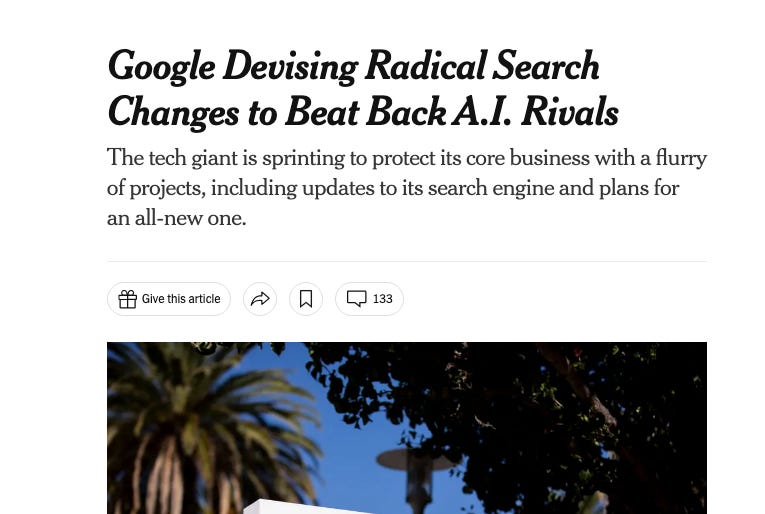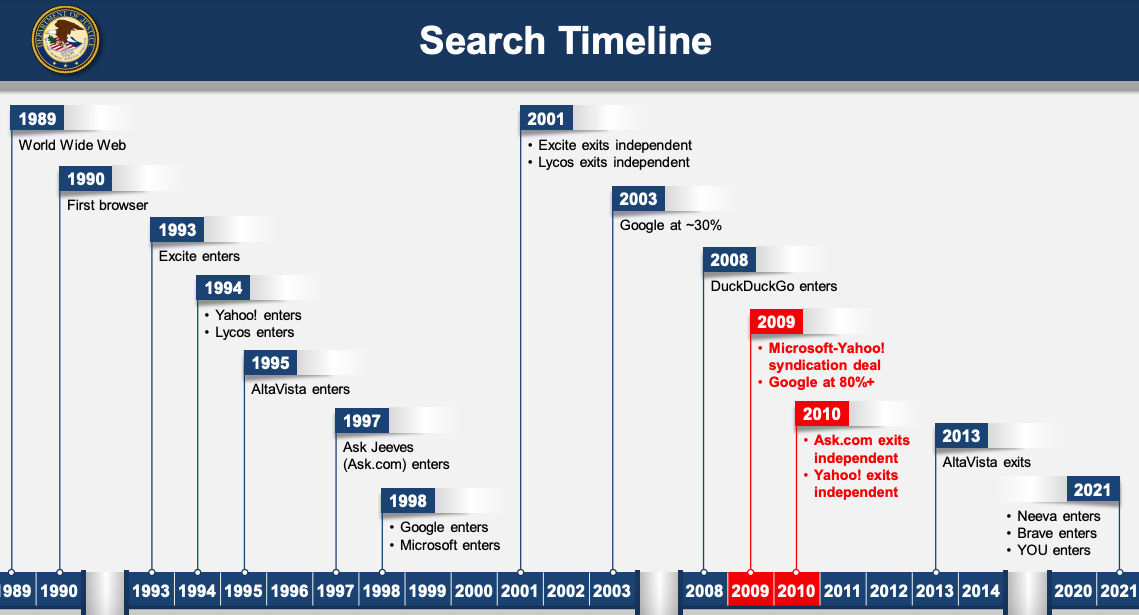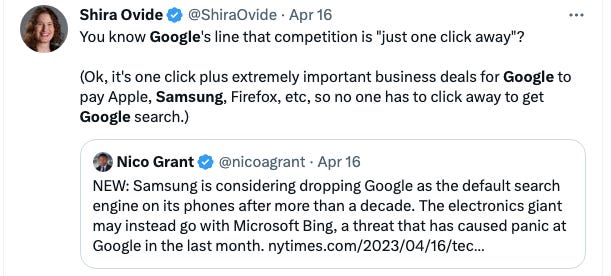How a Google Antitrust Case Could Determine the Future of AI
Google CEO Sundar Pichai is on a PR blitz around artificial intelligence and the threat to the search giant. The tech is real. But there's also an ulterior motive.
Welcome to BIG, a newsletter on the politics of monopoly power. If you’re already signed up, great! If you’d like to sign up and receive issues over email, you can do so here.
Today’s newsletter is about whether artificial intelligence will be monopolized, and how a Google antitrust case has become one inflection point for such a decision. To put it differently, while there’s a lot of chatter about how to approach AI policy, the Antitrust Division is actually doing AI policy.
First, a few items. I got profiled in Politico Magazine by Nancy Scola on the behind-the-scenes political work that I do, and how anti-monopoly confuses and excites the right and left. Also on May 4th, my organization is holding an anti-monopoly summit in D.C. There will be lots of great speakers, from FTC Chair Lina Khan to Antitrust Division chief Jonathan Kanter to Sonos CEO Patrick Spence. It’s gonna be great.
A bunch of you have already told me you’re coming, so I’ll see you there. For those who want more info, check out the line-up and agenda.
And now…
“The realm of science and its application to technology is expanding at a startling pace, and its limits are beyond calculation. The advances of the future can be made to serve the common welfare by affording opportunities for initiative and enterprise. Or they can contribute increasingly to the growth of private monopoly.” - Leon Keyserling, Chair of the Council of Economic Advisors to President Harry Truman
Over the past week, on 60 Minutes and then the New York Times, Google’s communications team has discussed the importance of artificial intelligence technology in the form of new human-seeming chatbots, highlighting not only the genuine innovation, but also the potential threat of these services to the search giant’s business model. The primary message was, new technology is here, and it’s very cool. But the secondary message is that Google is no longer a monopoly, and that the government should drop its antitrust actions against the search giant.
These are extremely important political statements in a debate about the future. But they aren’t what they might seem. So I want to explain why Google is making these claims, and why they matter.
First, let’s talk about the technology and its importance. AI is a broad method to take large data sources and run them through an algorithm to train a powerful pattern recognition software program. The theory behind AI has existed since the late 1950s, but only recently has the computing power and methodology advanced to become deployable on a mass scale. Unlike, say, crypto, or self-driving cars, artificial intelligence/machine learning looks like real general purpose technology. Today, large language learning model algorithms underpin computer-assisted language production, image generation, engineering, programming, and scientific endeavors such as protein folding.
And Google is a bit behind, at least in turns of consumer deployment. As with the shift from desktop to mobile, or mainframe to personal computing, we are at a technological inflection point. There’s an irony in this situation, because the search giant should, if one accepts their arguments about innovation, be on the leading edge. Much of AI technology was invented by DeepMind, a company Google bought in 2014.
Yet while Google provided substantial computing resources to DeepMind, aside from that it mostly sat on the technology, using AI to make tweaks to its search queries, its backend infrastructure, and its targeted advertising systems. Google deployed AI the way you would think, to preserve its monopoly revenue stream in the form of ad money. Anything outside that arena was treated as a fun science experiment. And indeed, many of the people who are now leading the field used to work at Google, and left, for precisely this reason. (This essay by an ex-Googler is a blistering indictment of the notion that the firm does much innovation.)
This isn’t to say AI hasn’t been publicly deployed. Less powerful forms of machine learning have been running behind the scenes at many companies for years, but late last year, a firm called OpenAI released AI-empowered chatbot technology known as ChatGPT, and it quickly garnered at least 100 million users. This consumer-facing product is very cool, and it passes the Turing Test, which means it can persuasively mimic human interaction. Microsoft incorporated the technology into its Bing search engine, as have other would-be rivals to Google, such as Neeva and DuckDuckGo. But Google had this technology a few years ago, and didn’t do much with it.
BIG is a reader-supported newsletter focused on the politics of monopoly and finance. This is journalism and advocacy that challenges power, so please consider a paid subscription. You can always get lies for free. The truth costs a few bucks, but in the long run it’s much cheaper.
And that brings me to the recently argued antitrust case against Google, which is based on a claim by the government that Google has been restraining the development and deployment of new technologies. In 2020, the Trump Antitrust Division accused Google of monopoly maintenance, arguing that the corporation’s 90-95% of the search market is a result not of superior acumen but unlawful business methods. Google, through both contractual arrangements with partners and its ownership of mobile operating system Android, excluded competitors from the search market.
Google pays $45 billion a year for contracts to lock out rivals, signing deals with “Apple, LG, Motorola, and Samsung; major U.S. wireless carriers such as AT&T, T-Mobile, and Verizon; and browser developers such as Mozilla, Opera, and UCWeb— to secure default status for its general search engine and, in many cases, to specifically prohibit Google’s counterparties from dealing with Google’s competitors.”
You can see the more than decade-long search monopoly in this DOJ timeline of the search market. Importantly, this decade is when Google bought Android and then monopolized the new technology of mobile search. In 2010-2012, the government investigated but did not bring a complaint, determining that the new mobile ecosystem would be organized by a handful of firms, namely Google and Facebook. (For more on that, see my piece, How Economists Corrupted the Internet.)
So how did Google manage its monopoly? Well it bought Android, which is the operating system for the majority of mobile phones globally. It put its search engine in front of users as the default, and then collected search data from those users it could use to tweak its own product while preventing rivals from improving theirs. It’s similar to what Microsoft was busted for doing in the 1990s, bundling Internet Explorer with its operating system, and paying distributors like Internet Service Providers (at the time AOL, Yahoo, etc.) to not carry its browser rival Netscape. In short, it bought up all the shelf space.
There are multiple antitrust cases facing Google, and this is just one of them. And these cases are clearly a very high priority for Google, all the way to the top. Google CEO Sundar Pichai has actually been sanctioned by at least one court for destroying documents related to his own conversations about these cases. Apparently chat logs show the SF “that Pichai personally asked whether a chat group’s history could be turned off and then attempted to delete that message.” The Antitrust Division says that Google has destroyed documents in its case as well. This kind of behavior isn’t just an indication of bad faith, but of deep concern. Google’s CEO is clearly thinking hard about the legal environment, because Pichai knows that how AI develops is as much a legal question as a scientific one.
The complaint is being heard by D.C. district court Judge Amit Mehta, a standard corporate liberal appointee who is generally deferential to corporate power. A week and a half ago was the summary judgment stage of the case, where Mehta will decide whether to toss the case, narrow it, or let it go to trial. In the hearing, the potential competitive threat of new technologies like ChatGPT came up, as did exclusive contracts with distributors, like Samsung.
A few days after the court hearing, the PR campaign took off. Lo and behold, Pichai was all over 60 Minutes talking about how AI is going to disrupt everything. And then, Nico Grant at the New York Times, with sourcing from Google, reported that Google’s monopoly is under threat. Samsung, which has a $3 billion contract to set Google as the default search on its phones, is thinking of switching over to Microsoft to make its now AI-empowered Bing search engine the default. Google employees were “shocked” and in a “panic,” according to messages shared with the newspaper.
For a long time, Google has made the point that ‘competition is just a click away.’ Clearly, it’s more like ‘competition is $45 billion away.’ So it’s worth asking the question, why aren’t AI-empowered search engines being offered to consumers right now where they actually engage in search?
Bing, Neeva and DuckDuckGo all have different approaches to incorporating the technology, but they mostly aren’t on the shelves, aka, they aren’t being presented to users because Google search is the default. And unless Judge Mehta decisively rules against these monopolistic business methods, then as Google rolls out its own AI programs, these will become the default as well. At worst, Google will control the AI-empowered web, at best, AI will be an oligopoly of the well-capitalized.
There is a precedent to foreclose this situation, which is to present a choice screen to users instead of giving them a pay-to-play default search engine. Such a procedure actually worked in Russia to break Google’s monopoly in 2017. If Judge Mehta forced that as a remedy, the $45 billion of annual payments would go away, DuckDuckGo and Neeva could compete, and it’s almost certain that Apple would unveil the search engine it is developing.
So such a decision would unleash a Cambrian explosion of innovation around AI and search. More importantly, the deployment of AI would be less likely to be monopolized, because this decision would create a presumption against monopolization and monopoly maintenance via defaults in this new business environment. OpenAI, Microsoft, Google, Amazon, or anyone else who grabs a chokehold would have to worry about a judge ruling against business methods intended to restrain others in this vibrant space. AI would be the open internet where anyone can put up a website, as opposed to a closed cable system controlled by Comcast.
Still, is there a legal claim now that Google is worried about Samsung leaving? It’s hard to see how there isn’t. So far, there’s not a lot of evidence that AI is impacting search ad market shares. Regardless, Google maintained its monopoly for more than a decade by restraining others, and that’s unlawful even if the conspiracy starts to fail. And I don’t think that the conspiracy is failing. My guess is that Samsung is using this moment to bargain a bit more aggressively over its contracting arrangement with Google. It’s possible that Microsoft outbids Google for Samsung’s default position. It’s also possible that the concern is exaggerated to encourage Judge Mehta to dismiss the case. Either way, it’s not like Neeva, or DuckDuckGo are getting access to the market, and it’s not as if Apple is being forced to deploy its own search engine.
Fundamentally, there’s a bit of a con here. ‘AI creating competition’ is a great talking point for both Microsoft, which wants to be relevant in search, and Google, which wants to convey that it is not a monopolist. But it’s not really true. What we know is that Google has been restraining the deployment of competition in search, and new technologies such as AI that it controlled internally but didn’t roll out. Still, Judge Mehta was intrigued by Google’s arguments, and impressed by fancy lawyering, instead of looking at it like a standard breach of contract case or a normal business dispute. That’s unfortunate, because the Sherman Act’s language is pretty clear, and Google’s behavior of ‘monopolization’ fits the bill.
The stakes here are immensely high. In the last technological inflection point, the shift from desktop to mobile, enforcers wrote rules to facilitate monopolization, and allow Google, Facebook, and Apple to dominate our phones. That occurred by the FTC closing its investigation in 2012 against Google with a unanimous vote, and then allowing Facebook to buy Instagram. That was, however, a different political moment.
Today, as this FT oped by Sarah Myers West illustrates, there’s genuine dialogue about consolidation in big tech/AI. And there’s an antitrust trial, the first of many, against Google, brought by a reinvigorated Antitrust Division. It may be the case that Judge Mehta rules that he wants artificial intelligence monopolized in the hands of a few. It would be a wild subversion of the law, and immensely destructive central planning by a Federal judge. It could also happen that Mehta surprises, and acts like Harold Green, the courageous judge who broke up AT&T and did more to bring forth an open future than any engineer in Silicon Valley. Regardless of how Mehta rules, the case is sure to be appealed.
Still, whatever happens, at least it’ll be done publicly, with the government’s antitrust enforcers on the right side, with the likelihood of appeal and Congressional action (such as potential antitrust bills against self-preferencing.) We have a long way to go before judges break from their self-imagined role as elite central planners, and start upholding the laws Congress passed. But it’s also on us, as a democratic society, to tell our lawmakers that we don’t want this fantastic scientific knowledge controlled by the few. We must be as jealous in defending our liberties as the monopolists are to take them away.
Thanks for reading! Your tips make this newsletter what it is, so please send me tips on weird monopolies, stories I’ve missed, or other thoughts. And if you liked this issue of BIG, you can sign up here for more issues, a newsletter on how to restore fair commerce, innovation and democracy. And consider becoming a paying subscriber to support this work, or if you are a paying subscriber, giving a gift subscription to a friend, colleague, or family member.
cheers,
Matt Stoller
P.S. I have a question. How are you using ChatGPT? I’m curious, because I haven’t quite figured out how to integrate these machine learning tools directly into my workflow. Please leave a comment if you’re using it.





Great piece, and congrats on the Politico article!
Many people in my life, personally and professionally, use ChatGPT to compose first drafts of communications of all sorts. Apologies for being so general, but I don't want to throw anyone under the bus.
I tried it out this year, and think it is VERY cool. I am a lifelong tech geek and normally adopt new tech into my life without hesitation. Except this time. I refuse to use it on ethical grounds. For around 15 years now, my first draft of almost all documents I create has been me talking into my phone. Before smart phones, it was me talking into a voice recorder.
I can see people who create mountains of content using it. I don't fault anyone in any industry or profession for using AI to create content (words to videos and everything else and in between).
However, I hope all do a thorough edit of those creations before they publish for wide consumption, and that a standard note of "AI was used to generate an initial copy of this content" is used for all such content.
That would make me content.
The real problem with search apps is that they now are VERY BAD at search precisely because they are VERY GOOD at advertising. I go back very far in this professional space and in the early days of search there was a very robust search language that obeyed all Boolean operations, recognized delineated search strings and even field limitations, so that one could specify exactly the textual string, and permissible search results.
Now, and carried to an extreme with Google, all searches no matter how well crafted are first treated as a series of independent keywords and those keywords are first compared to relevant advertisements, such advertising presented first in the search results ahead of more relevant results, often pages ahead. And the is little left not obeyed of formerly robust search language.
I would much rather pay a monthly fee for a search service that was not on an advertising supported financial model.